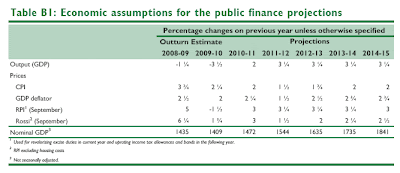Public sector efficiency experts on the job
As they keep reminding us, Labour's Big Fiscal Pledge is to halve the deficit by 2013-14.
In Darling's own words:
"Backed by legislation... the Government will ensure public sector net borrowing, as a share of GDP, falls every year and is more than halved by 2013-14."
And
according to their latest numbers that is precisely what they will achieve - Public Sector Net Borrowing (PSNB) falls from 12.6% of GDP this year, to 5.5% in 2013-14.
But even if the markets can live with that speed of retrenchment - and many think it's not fast enough to maintain confidence - there is still a serious problem. Because Darling's projections are based on a range of assumptions that bear virtually no resemblence to the real world - it is a fiscal fantasyland.
Part of the fantasy is their assertion that they can achieve their projected retrenchment without cutting so-called frontline services, and without increasing taxes beyond what they've already announced. As we've blogged many times, given their abysmal track record on public sector "efficiency" that's going to be impossible. Moreover, so far they have even failed to specify where their assumed"savings" are coming from - which specific spending programmes are going to face the budget axe?
But there is another even more dangerous strand of fantasy - their assumption that Britain's economic growth will soon bounce back to 3.25% pa:
So according to the Pre-Budget Report, over the five years from 2010-11, GDP growth is supposed to average 3% pa. But in a world of over-indebtedness, zombie banks, and tax increases, that is extremely unlikely. Consider:
- The average of independent forecasts for more or less the same period (2010 to 2013) is just 2% pa - and that was collected and published by the Treasury itself (see here page 18).
- Last time we had to tackle a fiscal crisis even remotely like the current one - in the 70s - GDP growth was pretty close to zero for the following fiveyears: in fact between 1976 Q4, when the IMF arrived, and 1981 Q1, when Geoffrey Howe finally completed the necessary fiscal consolidation, UK growth averaged just 0.4% pa.
- Japan's notorious Lost Decade of stagnation, following the collapse of its financial bubble in 1989, lasted... well... a good decade.
So what happens to Labour's halving of the deficit when their fantasy GDP growth doesn't materialise? Because as we all know, growth is the vital driver of fiscal health. Without growth, tax revenues remain depressed, welfare spending increases, and Darling's borrowing pledge won't be worth the legislative paper it's printed on.
The Institute for Fiscal Studies attempted to answer this vital question in their recent
Green Budget. They are naturally too polite and circumspect to accuse the government of spinning a fantasy, but they did take a close look at the fiscal consequences of slower growth.
The model a range of possible GDP scenarios - all more pessimistic than Darling's growth assumption.
Their
central case is that GDP growth will average 2% pa over the next five years rather than Darling's fantasy 3% pa - pretty much the consensus view among independent forecasters. And on that basis they project that the 2013-14 borrowing requirement will be about 1.7 percentage points of GDP bigger than Darling forecasts - ie 7.2% of GDP (
see page 125). Which means Labour miss their solemn and binding pledge to halve the deficit.
Personally, Tyler reckons 2% pa GDP growth still sounds too optimistic, and is more convinced by the IFS's pessimistic case. That assumes average growth of just 1.3% pa over the period - more than we got following the 1976 IMF visit, and more than Japan got in the 90s, but closer to the likely outcome than the IFS central case.
And on that basis, the IFS project that borrowing in 2013-14 will be around 8.2% of GDP - way higher than Darling's 5.5%. Far from halving the deficit, Labour would only have cut it by one-third. We'd still be having to borrow £120 - 130 bn pa, and our official national debt would be well in excess of £1.5 trillion. We'd have long since ceased to be a AAA credit, and the likely level of gilt yields doesn't bear thinking about.
So is Darling going to correct his fantasy projections in the forthcoming budget?
No sorry, that's another stupid question.
The real question is WTF does anyone believe them? Why doesn't everyone just laugh at such preposterous nonsense?
Because if these clowns somehow get re-elected, I tell you, we won't have much to laugh about then.
Labels: fiscal policy, politicos, spin
























